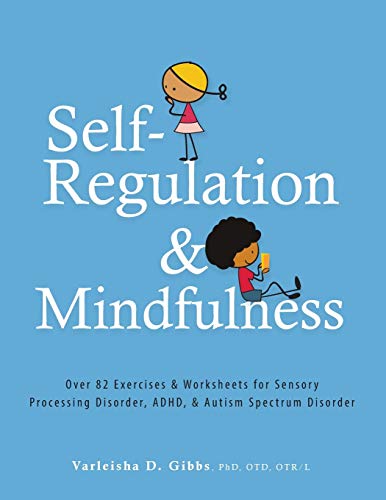When it comes to choosing your social learning theory bandura, there are hundreds of different choices. In our review, weve considered all the various features youll need to know before buying the best social learning theory bandura. We hope that through this article, with our comparison table, in-detail review of each product can help you decide which one is your best social learning theory bandura.
Best social learning theory bandura
Related posts:
Best social learning theory bandura reviews
1. Self-Regulation and Mindfulness: Over 82 Exercises & Worksheets for Sensory Processing Disorder, ADHD, & Autism Spectrum Disorder
Description
Varleisha Gibbs, PhD, OTD, OTR/L, has created a unique, evidence-based resource for helping children who have trouble self-regulating, staying focused, managing their senses and controlling their emotions.Based on the latest research in neuroscience, Self-Regulation & Mindfulness provides highly practical, kid friendly lessons to teach therapists, parents, educators and children about their brain and body, so they can build the needed skills to self-regulate.
- Hands-on activities
- Step-by-step exercises
- Coloring pages and worksheets
Clear, concise and fun activities to address your children's arousal, attention, and social participation:
- Touch and Heavy Work
- Hydration and Oral Motor Activities
- Metronome, Timing and Sequencing Exercises
- Right and Left Brain Integration Methods
- Patterns and Repetition Recognition
- Vision and Sound Skills
- Movement Coordination
- Inhibition Techniques
2. Social Learning Theory
Description
| An exploration of contemporary advances in social learning theory with special emphasis on the important roles played by cognitive, vicarious, and self-regulatory processes. |
3. Social Foundations of Thought and Action: A Social Cognitive Theory
Description
| Presents a comprehensive theory of human motivation and action from a social-cognitive perspective. This insightful text addresses the prominent roles played by cognitive, vicarious, self-regulatory, and self-reflective processes in psychosocial functioning; emphasizes reciprocal causation through the interplay of cognitive, behavioral, and environmental factors; and systematically applies the basic principles of this theory to personal and social change. |
4. Aggression: A Social Learning Analysis (The Prentice-Hall Series in Social Learning Theory)
Description
This book is concerned with why people engage in aggressive behavior. Theories of human behavior have changed over the years, as interest in approaches that depict behavior as instinctively determined or impelled by drive forces have declined as deficiencies became apparent. Perspectives based on social learning have emerged that increase our understanding of human behavior.In this book, the author has attempted to formulate a social learning theory of aggression, whether individual or collective, personal or institutional sanctioned. The goal is to improve the basis on which we explain, predict, and modify aggression.
A sizable portion of this book is devoted to demonstrating how social learning principles can be applied individually and at the social systems level to reduce deleterious forms of aggression. The use of social power as an instrument of change is also addressed. There is a discussion of social labeling and ethics of aggressive action.
5. Theories of Human Development: Integrative Perspectives
Feature
Used Book in Good ConditionDescription
Theories of Human Development is an introduction to the currently viable theories of human development: what they are, how they are developed, and how they are validated. The theories are presented within a three-part framework that includes the mechanistic, organismic, and contextualist perspectives. Contemporary theorists discussed in this text include Albert Bandura, Robert Siegler, Katherine Nelson, Esther Thelen, Gerald Edelman, Robert Kegan, Glenn Elder, and others.6. Social Learning Theory 1st (first) edition (authors) Bandura, Albert (1976) published by Prentice Hall [Paperback]
7. Psychological Modeling
Description
The phenomenon of learning has always been of fundamental interest to psychologists. Although much of the research in this area approaches the process of learning as a consequence of direct experience, this volume is principally concerned with learning by example.
A widening interest in modeling and vicarious processes of learning has been apparent in recent years. Psychological Modeling highlights the most important work done in the subject and offers an extensive review of the major theories of learning by modeling. In his introductory essay, the editor identifies the most important controversial issues in the field of observational learning and reviews a large body of research findings.
Among the questions debated in this volume are: How do observers form an internal model of the outside world to guide their actions? What role does reinforcement play in observational learning? What is the relative effectiveness of models presented in live action, in pictorial presentations, or through verbal description? What is the scope of modeling influences? What factors determine whether people will learn what they have observed? What types of people are most susceptible to modeling influences, and what types of models are most influential in modifying the behavior of others?
This volume deals with an important problem area in a lively fashion. Its special organization makes it a stimulating adjunct to all courses in psychology - undergraduate and graduate - in which psychological modeling is discussed. It also provides a readable introduction for educators and other professionals seeking reliable information on the state of knowledge in this area.





![Social Learning Theory 1st (first) edition (authors) Bandura, Albert (1976) published by Prentice Hall [Paperback]](https://images-na.ssl-images-amazon.com/images/I/41G8uyyk-iL.jpg)



